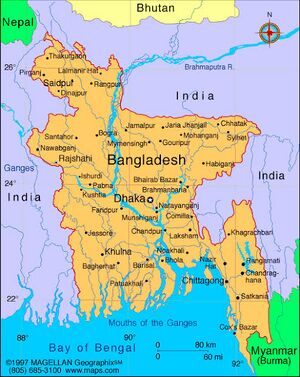Kalaikuri
| Author:Laxman Burdak, IFS (R) |

Kalaikuri is a village at a distance of 10 km from Nowgong in Sultanpur in Bogra district in Bangladesh. Kalaikuri inscription gives some details of administration of the subdivision of a district called Vithi. It mentions of Sringavera Vithi, and the office (adikarana) of the subdivision located at town named Purnakasila. Sringavera is identified with the modern Singra police station in in the Natore subdivision of Rajshahi district in Bangladesh. [1]
Kalaikuri Sultanpur Copper-plate Inscription of the Gupta Year 120 (=A.D. 439)
Kalaikuri Sultanpur Copper-plate Inscription of the Gupta Year 120 (=A.D. 439) provides us some information about land grants to Brahmanas during Gupta period. Tej Ram Sharma [2]writes about some Brahmana names appearing in inscription:
- Devabhatta (देवभट्ट) (No. 43, LL. 14-15; L. 26) : Deva, the first part of the name, means 'god, heavenly or divine'. The second part is a name-ending suffix used for learned brahmanas. The ending Bhatta denoting a scholar later became a surname, just as the English word 'Master' is undergoing a change in usage with the Gujarati-speaking people and the word 'professor' may soon have with the Marathi-speaking people. Devabhatta was a brahmana. He was an inhabitant of Pundravardhana. He belonged to Vajasaneyacarana, and was versed in the four Vedas.
- Amaradatta (अमरदत्त) (No. 43, L. 15; L. 26) : The first part 'Amara' means 'a god' and the second part 'datta' means 'given'. Thus the whole will mean 'Given by gods'. He was an inhabitant of Pundravardhana, and is described as belonging to' Vajasaneyacarana and as versed in the four Vedas. Amaradatta was also the name of a lexicographer and also of a prince in the Kathasaritsagara.
- Mahasenadatta (महासेनदत्त) (No. 43, L. 15; L. 26) : The first part is 'Mahasena' which is the name of Karttikeya or Skanda .3 The second part is 'datta' which means 'given'. The whole expression means 'given by god Skanda'. Mahasenadatta was a brahmana inhabitant of Pundravardhana, belonging to Vajasaneyacarana and versed in the four Vedas.
- Vata-nadi (वाटा-नदी) (No. 43, L. 22) : We get a reference to the Vata-nadi in an inscription at Kalaikuri, Sultanpur near Naogaon, Rajshahi district, East Pakistan now Bangladesh. It was flowing to the east of a village named Dhanyapatalika. The Vata nadi appears to be the modern Bara-nai, Singra lying about 10 miles to the north-east of its junction with the Atrai. It flews west to east through the southern part of the Rajshahi district.[3]

